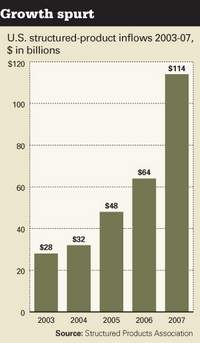by Kenneth Lim
Prospect News
Boston, Oct. 24 – The Federal Deposit Insurance Corp.’s decision to exclude structured notes from its temporary liquidity guarantee program could encourage more structured certificates of deposit and a rethink of nomenclature, industry practitioners said Friday.
The FDIC this week issued an interim ruling that structured notes will be excluded from the temporary liquidity guarantee program. The program was set up to guarantee senior debt issued by U.S. banking institutions until 2012. Non-U.S. banks are not covered under the program, and structured certificates of deposit, which are already insured by FDIC under most circumstances, are not affected.
“The primary purpose of the program is to provide liquidity to the interbank lending market and promote stability in the unsecured funding market for banks,” said FDIC spokesman David Barr. “The purpose is not to encourage innovative, exotic or complex funding structures or to protect lenders who make high risk loans in hopes of high returns.”
The public has 15 days after the rule appears in the Federal Register – expected to be early next week – to comment, after which “you’re probably stuck with it,” said Morrison & Foerster attorney Oliver Ireland.
“After that, you can go back and ask them to change the rule, but whether you’re going to get it changed at that point is a lot tougher,” Ireland told Prospect News after a conference call hosted by his firm and the Structured Products Association.
Trying to get FDIC to possibly include some structured notes could be worth the effort because the insurer’s ruling appears to have room for clarification, Ireland said.
“The line they’ve drawn, in my opinion, is arbitrary at best,” he said.
Noting that FDIC is necessarily creating and adjusting rules on the fly, Ireland said the structured products industry can help the insurer to make a clearer distinction.
“What they say in the rule is that they’re not trying to encourage innovative or exotic or complex funding structures,” he said. “They don’t present an analysis of what kind of funding structures are being used, what roles they have…it’s not a data-based distinction.” But getting the FDIC to change its mind may not be easy.
"There’s a suspicion especially among the bank regulators about derivative products even today…You’re probably working against some old prejudices,” he said.
Keith Styrcula, chairman of the Structured Products Association, acknowledged that not all structured notes will probably be included even if FDIC can be persuaded to extend the scope of the program.
“The objective is to enhance liquidity for the banks,” he said at the conference call.
“I think some structured products arguably more than others achieve that goal.”
Language, CDs in spotlight
Styrcula also noted that this could be an opportune time to rethink the nomenclature that is typically used with structured products so pertinent distinctions between different types of products are clearer.
“The concept to non-structured product practitioners is that these are complex products,” he said. “Maybe we should be paying attention to nomenclature…to align it more with what they’re trying to do.” Styrcula also said that the ruling could hasten the growth of structured certificates of deposit, which enjoy FDIC insurance coverage, as an alternative to principal-protected structured notes.
“I think you’ll see more of a shift toward CDs,” he said.
But the impact of the ruling on the market may not be significant, a structured products distributor told Prospect News.
“The way I understand it, it’s basically business as usual for us, right?” the distributor said.
“Structured notes weren’t guaranteed in the past, now they’re still not guaranteed. It’s not like they took away guarantees.” Structured notes could, when compared to other investments that enjoy FDIC insurance, appear less attractive, but the wrapper is not going anywhere, the distributor said.
“If you want a structured product that’s guaranteed by the FDIC, you’ll have and always have had CDs,” the distributor said. “But there are well-known limitations to CDs. There’s a cost to providing the insurance, and there’s a limit to how much can be insured. So I don’t think structured notes will become obsolete. I do think CDs, which have been growing recently, will continue to grow regardless of whether they ruled one way or the other.” As to whether FDIC can be swayed to include structured notes, the issuing banks of structured products are likely in the driving position, the distributor said.
“The FDIC is concerned about market liquidity and creating market stability, and the bottom line is they’ll need to be convinced that the banks really need this source of capital to be guaranteed,” the distributor said.
“I don’t know if anyone other than the banks will be able to convince them about that. The banks have to take the lead on this one.” A participant in the conference call also wondered if the FDIC could be persuaded to include some structured notes.
“There’s a distinction that they’re trying to draw, which is the types of funding that are essential to maintaining the liquidity of banks…I think it would be hard to argue that structured funding does that,” the participant said.
For a free trial to Prospect News’ Structured Products Daily, click here.
Subscribe to:
Post Comments (Atom)



No comments:
Post a Comment